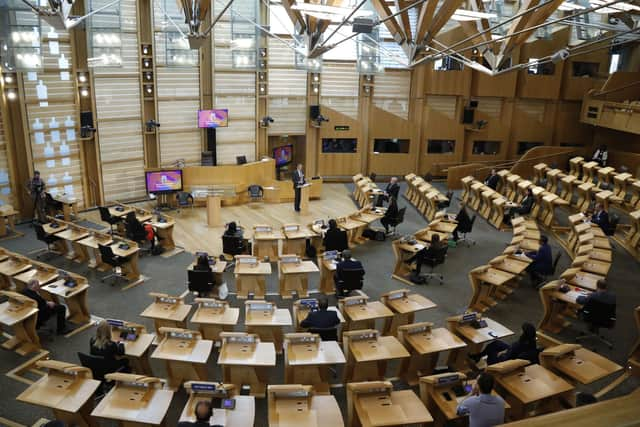In Scotland, some MSPs do not need to fear the wrath of their constituents – Susan Dalgety
and live on Freeview channel 276
The circular debating chamber, designed to promote consensus rather than division, is often on our TV screens. And the First Minister has never knowingly turned down an opportunity to tell us what to do.
But the inner workings of the Scottish Parliament are a mystery to most people. How decisions are reached, whether it be the passing of new laws or agreeing the country’s annual spending plans, is a process understood by only a few.
Advertisement
Hide AdAdvertisement
Hide AdSo it is hardly surprising that, as the parliament approaches its silver jubilee next year, there is a growing clamour for reform. The latest comes from a Tory MSP, Donald Cameron, who has just announced his intention to lodge a bill to change how Holyrood works.


His biggest complaint about the current set-up is that it is very difficult for opposition MSPs to hold the Scottish Government to account. Now, that may be simply because the SNP, with a little help from their friends in the Scottish Green party, have a majority, so what Nicola Sturgeon says goes.
Or, as former SNP minister Alex Neil said earlier this month, it may be because the parliament is full of “nodding donkeys”, MSPs who are happy to do what they are told by their party bosses in exchange for their £66,600-a-year salary and a subsidised canteen. Mr Neil is well known for his candour, and while I would never be so presumptuous as to describe our elected politicians as “donkeys”, I have some sympathy with his view.
I spent a large part of my life in and around the corridors of Holyrood and I was struck by how mundane many MSPs were, and how arrogant. But that is probably the nature of the beast. No new law will change that.
Advertisement
Hide AdAdvertisement
Hide AdWhat is required, however, is a better way of working, and I would start with how our MSPs are elected. The current system has created an exclusive club of MSPs who are beholden only to their party, and needs reform.
There are 129 MSPs, with 73 elected to represent a constituency, like Ash Regan, the MSP for Edinburgh East. The remaining 56 are what are known as ‘list’ members and represent one of eight parliamentary regions. Veteran Labour MSP Sarah Boyack and Tory newbie Sue Webber are two of the seven list MSPs for Edinburgh and the Lothians.
Under this ‘additional member system’, generally the more constituency seats a party wins, the fewer ‘list’ seats it will get. It was designed to bring balance to the parliament. Instead, it has created a class of MSPs with no constituents to keep them on their toes. Many are more interested in internal party matters or their own personal causes than properly representing the best interests of the people in their region.
The committee structure, which is supposed to scrutinise the work of government, has largely become an echo chamber for ministers and also needs to be sharpened up. Whether Donald Cameron’s bill ever reaches the debating chamber, let alone is passed into law, remains to be seen. But our parliament is long overdue for a reboot.
Comment Guidelines
National World encourages reader discussion on our stories. User feedback, insights and back-and-forth exchanges add a rich layer of context to reporting. Please review our Community Guidelines before commenting.